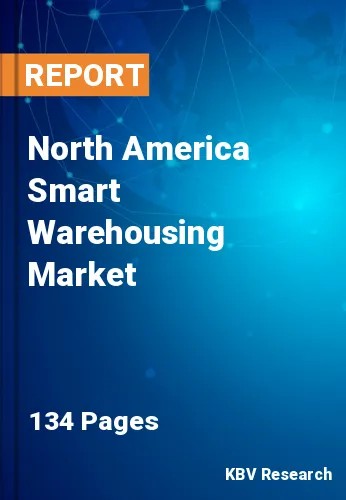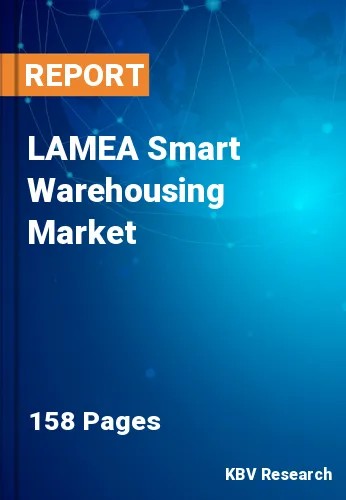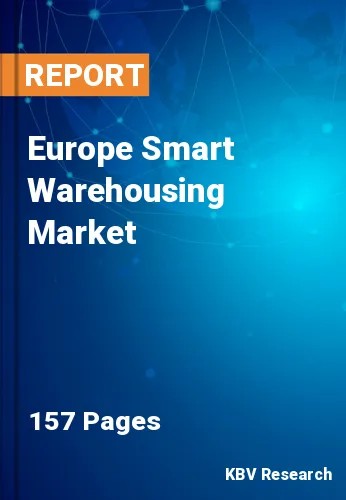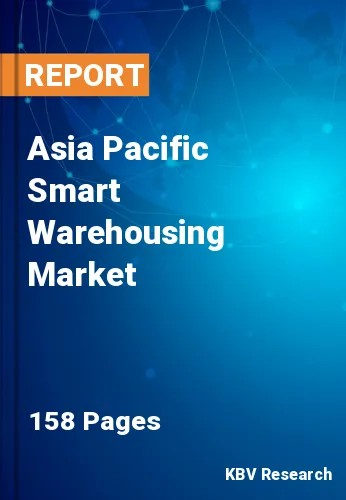The Global Smart Warehousing Market is Estimated to reach $29 Billion by 2028, at a CAGR of 11.2%
Special Offering :
Industry Insights | Market Trends | Highest number of Tables | 24/7 Analyst Support
Smart Warehousing Market Growth, Trends and Report Highlights
According to a new report, published by KBV research, The Global Smart Warehousing Market size is expected to reach $29 billion by 2028, rising at a market growth of 11.2% CAGR during the forecast period.
The On-premises segment dominated the Global Smart Warehousing Market by Deployment Mode in 2021, thereby, achieving a market value of $16.4 billion by 2028. The popularity of on-premises-based smart warehousing solutions across verticals, like retail & e-commerce, transportation & logistics, and manufacturing, is boosted by the highly secure data encryption and total data visibility & control feature. Moreover, on-premise deployment of smart warehousing solutions also provides the organization a complete control over the management of their storage. Hence, the growth of this segment is increasing.
The RFID segment is showcasing the CAGR of 11.5% during (2022 - 2028). The data is subsequently transferred to or between the digital tag & an automated scanning system, which records the product's information, using radio waves. RFID substitutes bar code scanners, which require the bar code to be synchronized with the scanner to be recognized. To identify the package, RFID scanners are pointed in the general direction of the package, due to which, it is being utilized in numerous firms all over the world.
The Transport Management segment is leading the Global Smart Warehousing Market by Application in 2021, thereby, achieving a market value of $10.2 billion by 2028. TMS, or transportation management systems, are an important part of supply chain management. A functional TMS simplifies various fulfillment operations and enables enterprises to transport products at a low cost. TMS also deals with intermodal freight movements, which include inbound, outgoing, domestic, international, & commercial shipments. TMS's biggest feature is that it can work effortlessly within organization or with a third-party logistics provider (3PL) if one outsources their fulfillment.
The Solution segment has shown growth rate of 11.3% during (2022 - 2028). The rising growth of the segment is owing to the increasing workloads on various organizations, due to which, businesses are majorly shifting toward automation and clouds. The integration of automated and cloud-based solutions significantly streamlines numerous processes under an organization. Moreover, it can also reduce the number of human labors that are required for managing warehouses. Therefore, the growth of the segment is augmenting due to this factor.
The Large Enterprises segment acquired maximum revenue share in the Global Smart Warehousing Market by Organization Size in 2021, thereby, achieving a market value of $18.8 billion by 2028. Large enterprises have begun to deploy smart warehousing solutions and are concentrating on executing advanced technologies to manage the complete supply chain management process across channels. Large organizations would be able to manage complex inventory procedures because of the availability of smart warehousing technology like RFID, IoT, analytics, and AI.
Automotive segment is showcasing a CAGR of 11.6% during (2022 - 2028). The concept of Supply Chain 4.0 proposes that businesses should become faster and more precise in their logistics & operations management. To digitize the ecosystem and boost complete efficiencies in the automotive sector, opportunities exist in planning, physical flow, performance management, order management, cooperation, and strategy.
North America is the fastest growing region in Global Smart Warehousing Market by Region in 2021, and would continue to be a dominant market till 2028; thereby, achieving a market value of $9.8 billion by 2028. The Europe market is estimated to witness a CAGR of 10.5% during (2022 - 2028). Additionally, The Asia Pacific market would exhibit a CAGR of 12.1% during (2022 - 2028).
Full Report: https://www.kbvresearch.com/smart-warehousing-market/
The market research report has exhaustive quantitative insights providing a clear picture of the market potential in various segments across the globe with country wise analysis in each discussed region. The key impacting factors of the market have been discussed in the report with the elaborated company profiles of IBM Corporation, Oracle Corporation, SAP SE, Infor, Inc., Softeon, Körber AG, Manhattan Associates, Inc., PTC, Inc., Tecsys, Inc., and Epicor Software Corporation.
Global Smart Warehousing Market Segmentation
By Deployment Mode
- On-premises
- Cloud
By Technology
- Automated Guided Vehicles (AGV)
- IoT & Analytics
- RFID
- AI in Warehouse
- Blockchain & Others
By Application
- Transport Management
- Inventory & Order Management
- Yard & Shipping Management
- Labour Management
- Others
By Component
- Hardware
- Solution
- Warehouse Management Systems
- Warehouse Control Systems & Others
- Services
By Organization Size
- Large Enterprises
- Small & Medium Enterprises (SMEs)RFID
By Vertical
- Transportation & Logistics
- Retail & Consumer Goods
- Automotive
- Government
- Healthcare & Life Sciences
- Manufacturing
- Mining
- Food & Beverages
- Others
By Geography
- North America
- US
- Canada
- Mexico
- Rest of North America
- Europe
- Germany
- UK
- France
- Russia
- Spain
- Italy
- Rest of Europe
- Asia Pacific
- China
- Japan
- India
- South Korea
- Singapore
- Malaysia
- Rest of Asia Pacific
- LAMEA
- Brazil
- Argentina
- UAE
- Saudi Arabia
- South Africa
- Nigeria
- Rest of LAMEA
Companies Profiled
- IBM Corporation
- Oracle Corporation
- SAP SE
- Infor, Inc.
- Softeon
- Körber AG
- Manhattan Associates, Inc.
- PTC, Inc.
- Tecsys, Inc.
- Epicor Software Corporation
Related Reports:



